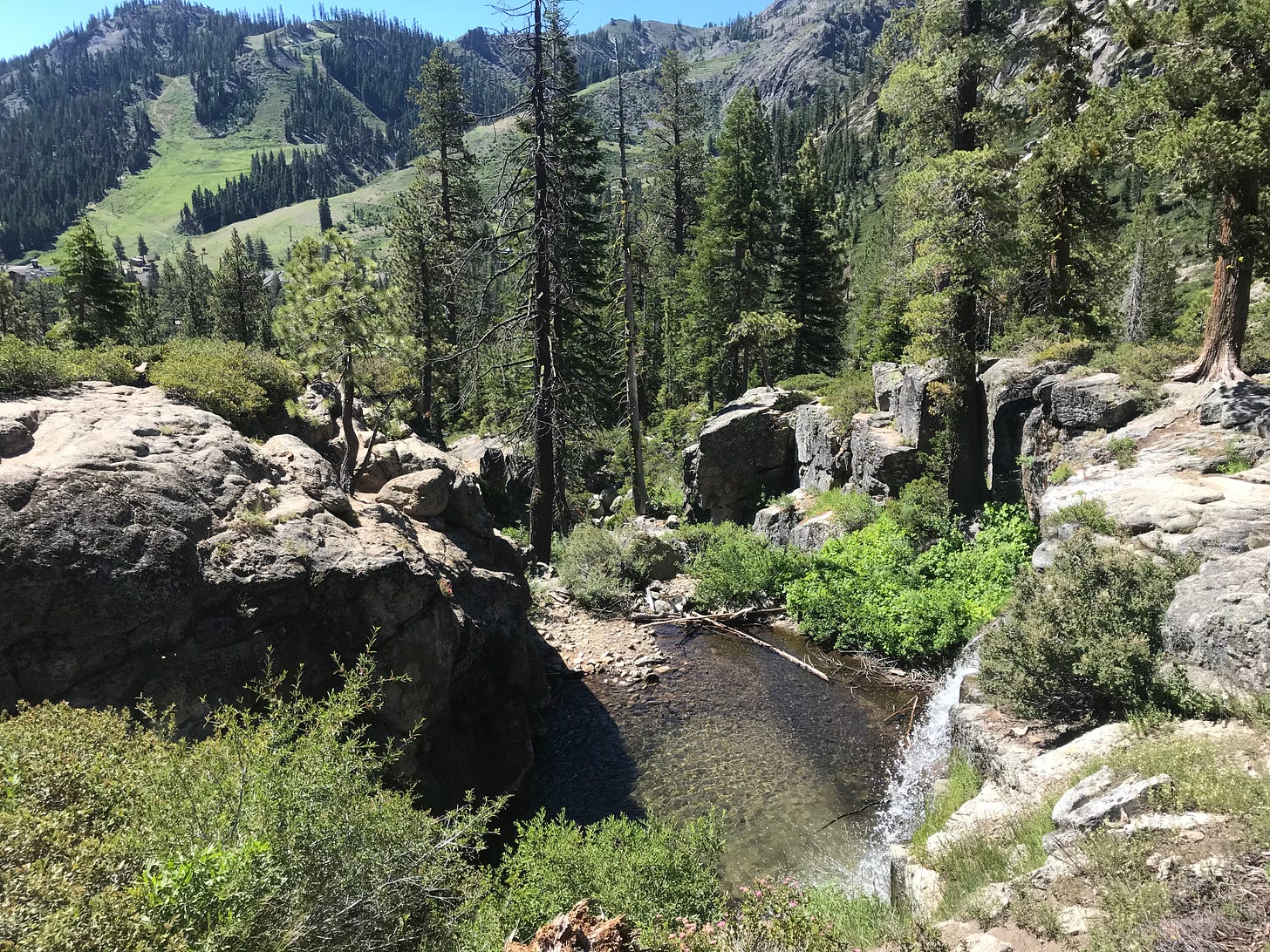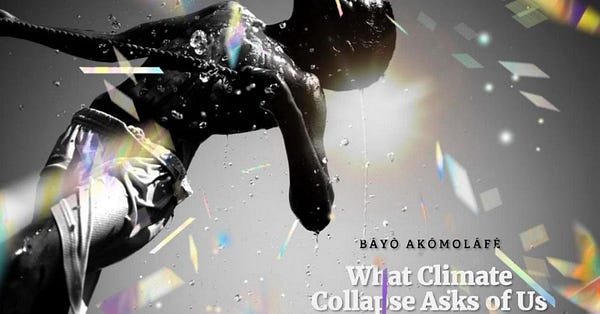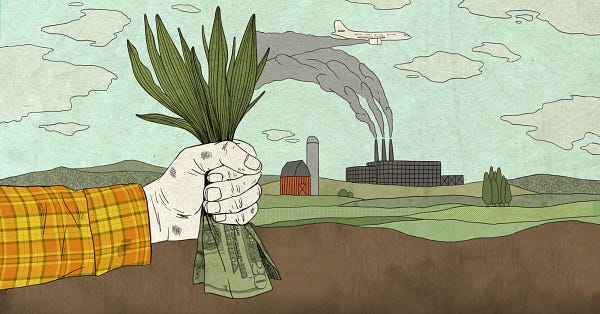The Breeze - Issue #19
Chamath pledges climate funding. How can capitalism help with climate change?
The Breeze is a free weekly email about climate tech investing.

On Saturday Chamath Palihapitiya, CEO and Founder of Social Capital, announced via tweetstorm that he will invest billions into climate tech over the next few years:

This is the biggest pledge to invest in sustainability from a credible mainstream VC. A few months ago I would have heralded it as a major win for climate tech. Now I’m not so sure. My thinking has evolved as I’ve been grappling with the shortcomings of unbridled capitalism with climate change.
Chamath’s announcement made me consider what investing in sustainability looks like when taken to its limit. What happens when trillions of investor dollars flow through our system into climate tech?
The good news is that we’ll make significant progress toward decarbonizing the economy. We’ll electrify everything from stovetops to semi trucks. We’ll power our homes with wind and solar. We’ll reduce food waste and eat more plants. These positive trends are in motion. Investing more capital will get them to a point where market forces can drive significant reduction in GHG emissions quickly.
Chamath’s pledge pushes this forward. As I wrote in Issue #4, he sees the focus of the economy shifting from pure industrial efficiency to resiliency. In March he said, “I think the world now is going to swing the pendulum towards resiliency… It’s not cheaper, faster, better. It’s slower, it’s more methodical, it’s more expensive, but it’s more reliable.”
My read is that he sees the world as vulnerable to climate change, and investing in infrastructure now will help us adapt to catastrophes later (while earning him a nifty profit). In this week’s tweetstorm, he also hints at investing in mitigation — preventing those catastrophes from happening. We’ll have to wait and see if he does.
I appreciate that Chamath is inviting anyone from around the world to submit a proposal. This makes sense because climate change is a global phenomena, and the voices of people at the front lines of changing ecosystems are still underrepresented and undervalued. He emphasizes the value of a framework or process for tackling climate change rather than individual solutions, which recognizes the complexity of our climate predicament.
Yet he falls into classic trappings of winning the capitalist game. He wants to own, not collaborate. He’s only considering majority stakes (51%+) in companies, so he can direct them as he pleases. One of the 4 potential solution examples he cites — drone reforestation — isn’t proven to be effective. It might even have a net negative impact on ecosystem redevelopment (see the Yale report). This makes me question how he’ll evaluate proposals and choose investments.
Solving climate change should be an open, collaborative effort, not one controlled by a private entity. Government should be involved to provide guardrails where necessary and scale when appropriate. Scientists should be able to independently monitor and evaluate the effects of attempted solutions. We need thousands of companies and organizations working on this together, not individual entities locking up their IP. The race for a COVID-19 vaccine serves as an example: we need to incentivize international organizations to act quickly and be able to verify results thoroughly.
The most effective “investments” for the planet probably won’t make it on Chamath’s radar because they don’t earn the returns he seeks. The Amazon is burning and Borneo rainforests are being decimated for palm oil. Conserving these crucial living ecosystems should be our top priority.
Today’s capitalism won’t solve that problem; in fact, it is the scourge that got us here. We have to realign incentives with our sustainability values to get the outcomes we need.
For example, one of Drawdown’s top 5 solutions for reducing GHG emissions is educating girls in developing countries. Education enables women to control their lives, earn more and make their own decisions about family planning. How could investing in education like this become valued within a capitalist framework? Today it’s often viewed as NGO or non-profit work. Perhaps governments could provide grants that reward startups for teaching girls. The startup Andela trains workers in Africa in digital skills and engineering, and connects them with work opportunities at tech companies. Maybe there’s a way to innovate on this model around earlier education with the right incentives.
Our world works within a capitalist framework. We view things (and people) as valuable if and only if they’re productive or sellable. It’s designed for an industrial era focused on growth, measured by GDP. This is great for anything aligned with financial profit, like traditional startups. But it’s clumsy at valuing things we can’t easily put a price on, like the natural world.
Today, nature is primarily viewed as valuable if it can be extracted and profited from. As long as we view nature as a utilitarian resource for our benefit, we will continue to harm the environment in our quest for growth. We’ll bulldoze mountains for condos, pump water from across state lines for golf courses in the desert, and clear land for projects like utility-scale solar just as we did for oil pipelines.
The shift we need to make is to prioritize nature differently than profits. If we’re serious about improving the health of our planet, we have to value it like we do life. When we force nature into a financial framework, inevitably something will come along that we think is financially more valuable. We have to view nature as valuable in itself and redesign our unbridled capitalist system to reflect it.
I didn’t expect to question the extractive attributes of capitalism in this journey. But I don’t think that the way we got here can get us out. It might sound hypocritical; I’m moving money through this system too. But it hasn’t blinded me from looking closely at what’s going on. I’m questioning if my own approach contributes to manipulating nature to fit within a convenient story for my self-interest.
How do we get capitalism to work for our new values? I’ve heard that Kate Raeworth’s doughtnut economics is promising because it includes ecology as fundamental to the model of prosperity. I have more to learn there. I’m also interested in learning from indigenous leaders who have been stewards of land for centuries.
Sharing my journey with you here and on Twitter has helped me work through these ideas and think through my role. On Monday my friend Sumon gave me jolt of inspiration in suggesting that I bring together folks who are interested in thinking through this shift:

This has got me thinking about how to activate people in this way. Are you interested in this too? I’m looking to deepen my learning and connect with leaders on this journey. Please reply and let me know.
Trade Winds

In the essay The Cure of the Earth, Charles Eisenstein challenges conventional alarmist climate narratives, saying, “Environmental scare tactics aren’t working.” Lasting change comes from a place of love. He invites us to ally with the guardians of the Amazon:
Love of life is the guide and motivator of ecological healing on Earth. Next comes learning how to put that love into action. How do we do that for that most alive of all places, the Amazon? Drawing from our own wisps of love, we support those who love it the most; we support its family. We ask them what they need and how we can support their guardianship just as we would like support for ours. On the one hand, that might mean supporting organizations who work closely with Indigenous peoples there (see list at the bottom of this article). On the other, it means looking at how the modern world continues to damage the Amazon and all else that is precious.


In a long piece titled What Climate Collapse Asks of Us, Bayo Akomolafe explains that we want to identify climate change as a problem because we want to fix that which reminds us of our own mortality:
Campbell, McHugh, and Ennis finally insist that the reason we cannot solve the problem of climate change is because climate change is not a problem. We cannot save the world from climate change because climate change is the world – incalculably more complex and more multidimensional than our organizations can frame or address. “Climate change is so thoroughly unbounded that organizations exist within it, because nothing will exist outside it.” We struggle with it because of the dynamics of centralizing human permanence and survivability. We struggle because of a modernity-reinforced ‘feeling’ of entitlement that the world ought to be stable, convenient, and user-friendly. The post-Holocene turbulence we experience is existentially jarring: the message we cannot face is that we too are transient, that we are not the fulcrum upon which the universe is balanced, and that the coddling and pampering of a historical inflection in the natural rhythm of things must now give way to foreclosure.


My friend Maddie Oatman wrote about the promise and questions of carbon sequestration with regenerative farming in Could Paying Farmers to Store Carbon Help the Climate and Save Farms? The heart of the question is the accuracy of measuring how much carbon soil can store:
It’s relatively easy to test a plug of soil for carbon. What’s less simple is predicting how much carbon dioxide a farmer may lock up across thousands of acres of land with varied soils over many years. Indigo’s [CEO David] Perry says the company will combine the results of its randomized soil tests with satellite data and machine learning to improve the accuracy of measuring the carbon load of large tracts of farmland.
But as scientists with the World Resources Institute pointed out recently, the factors that influence how much carbon soil can retain and for how long are “enormously complex.”


My hometown Menlo Park announced that it will become the first U.S. city to be carbon neutral by 2030 by cutting GHG emissions by 90% and offsetting the remaining 10%. 🙂
I’ve phased out the Funding News section to focus on editorial and articles. For weekly startup funding info, I’d suggest the Climate Tech VC newsletter.
Invest with Jetstream
I’m investing in climate tech startups through my Jetstream Syndicate. It’s a group of over 250 angel investors who are supporting early-stage climate tech founders. It’s free to join, and there’s no obligation to invest. You can participate with checks as small as $1000. We’ve invested in startups like SINAI Technologies, Pachama, and Windborne Systems. 💸
Thanks for reading! Special thanks to Parker and Becky for reading drafts.
Stay breezy,
Tommy


This is a great post and I appreciate your references to the many people who are working on this issue from different angles. And I agree with you that you cannot address the climate change through a purely capitalistic lens.